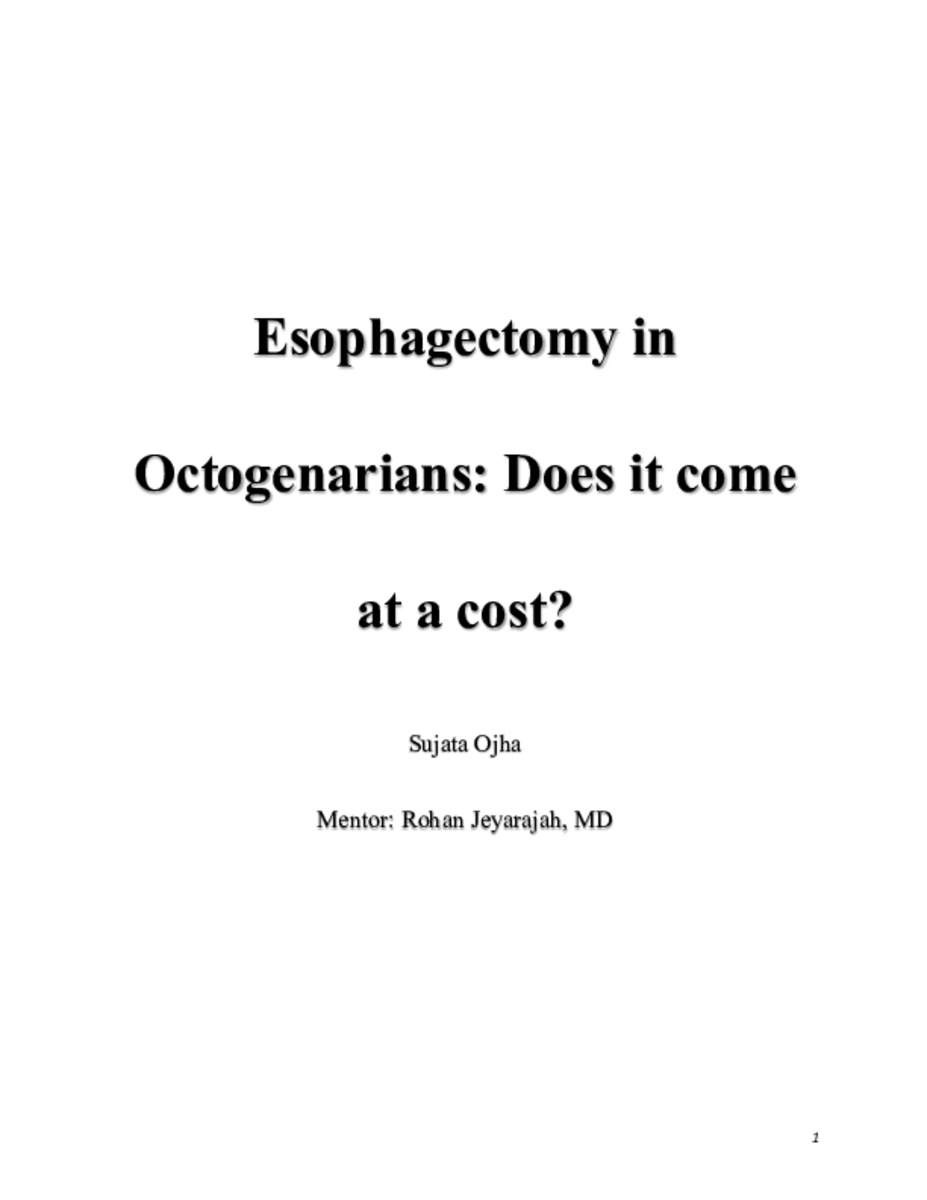Esophagectomy in Octogenarians: Does it come at a cost?Show full item record
| Title | Esophagectomy in Octogenarians: Does it come at a cost? |
|---|---|
| Author | Ojha, Sujata |
| Date | 5/1/2023 |
| Abstract | Research Question: Do octogenarians, or patients above the age of 80, who undergo esophagectomy have a higher mortality and morbidity in comparison to patients younger than the age of 80 years? Is surgical intervention in patients with esophageal cancer over the age of 80 a favorable course of treatment? Background: Esophageal cancer is highly aggressive cancer and typically presents at a later stage at diagnosis. The increasing incidence of esophageal cancer in combination with early metastasis and a relatively poor survival rate makes this one of the most aggressive cancers worldwide. Esophageal cancer is asymptomatic in initial stages, therefore more than 30% of patients have metastatic cancer at the time of diagnosis. Due to the late stage of diagnosis combined with accelerated metastasis, esophageal cancer has an increased fatality rate. The incidence of esophageal cancer increases with age. With the ageing population and the increasing number of people over the age of 65, it is anticipated that there will be a rise in the demand for more surgical intervention in this demographic. Due to the aggressive nature of the disease, and its anatomical and physiological properties, surgical approach is an appropriate choice of treatment. Esophagectomy is the main-stay surgical procedure for the treatment of esophageal cancer. Surgical intervention in the geriatric population has a higher risk of perioperative morbidity and mortality due to higher prevalence of comorbidities such as heart disease, diabetes, chronic obstructive pulmonary disorder, increased frailty, and lack of compensatory physiologic reserve. The literature on esophagectomy in octogenarians, patients over the age of 80, is limited. There are apparent concerns of patients in the older demographics being denied surgical interventions. In order to determine the safety of esophagectomy in this cohort, this study aims to analyze the outcomes of esophagectomies performed on octogenarians who have esophageal cancer. Materials and Methods: In this IRB-approved study, 143 esophagectomies performed for esophageal cancer between 2012 and 2020 were retrospectively examined. Oncologic outcomes, surgical results, and patient demographics were examined. The octogenarian group was compared to patients younger than 80 years of age. Results: Out of a total of 143 esophagectomies, 136 patients were <80 years old while 7 were =80 years old. Octogenarians received significantly less neoadjuvant therapy compared to younger patients (42.9% vs 80.2%, p=0.02). No statistically significant difference was noted in complication rate, length of stay (LOS), estimated blood loss (EBL), or mortality. However, octogenarians were found to have an increase in severity of complications compared to younger patients. Conclusion: Esophagectomy can be performed in octogenarians who are carefully selected. This study shows that esophagectomy in octogenarians does not increase complication rates or mortality however does have an increased severity of complication. With explicit expectations and preparation for the significant risk of more serious postoperative sequelae, our evidence suggests that esophagectomy can be administered selectively to older patients. |
| Link | https://repository.tcu.edu/handle/116099117/63588 |
| Department | Burnett School of Medicine |
| Advisor | Jeyarajah, Rohan |
Files in this item
This item appears in the following Collection(s)
© TCU Library 2015 | Contact Special Collections |
HTML Sitemap




